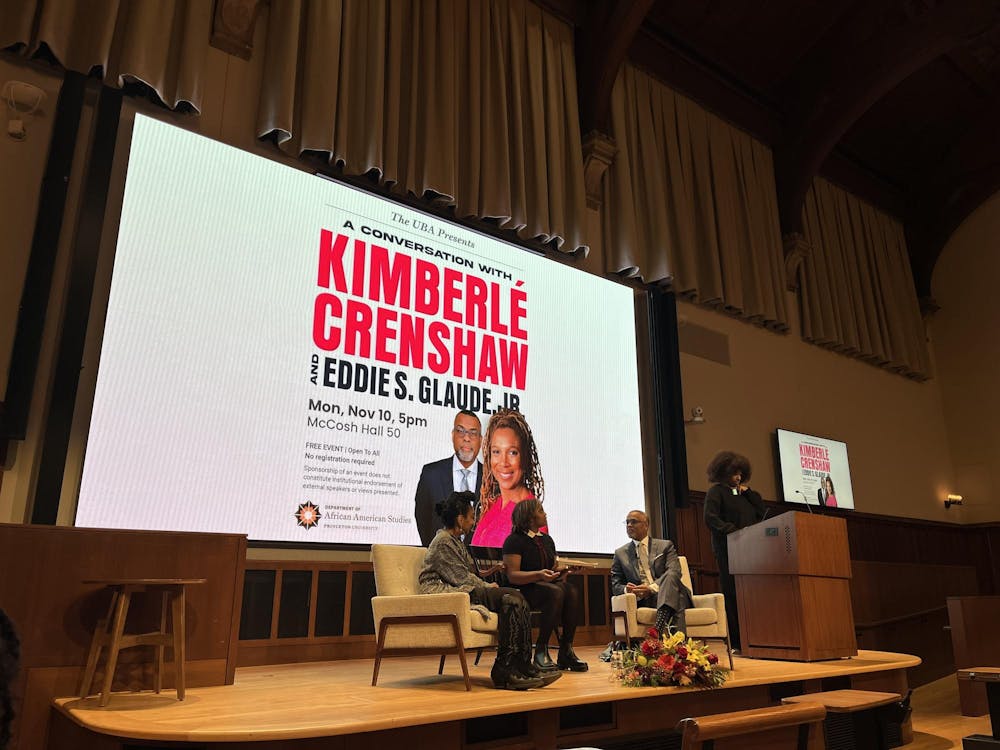Law professor and civil rights advocate Kimberlé Crenshaw joined African American Studies Professor Eddie S. Glaude Jr. for a conversation on Monday, discussing the state of higher education and diversity, equity, and inclusion (DEI) during the Trump administration.
Crenshaw is a law professor at Columbia Law School and the University of California, Los Angeles. She is famous for coining the term “intersectionality” in 1989 to describe the simultaneous racism and sexism that Black women face. “Because the intersectional experience is greater than the sum of racism and sexism,” Crenshaw wrote in 1989, “any analysis that does not take intersectionality into account cannot sufficiently address the particular manner in which Black women are subordinated.”
However, the conversation did not center on intersectionality. Crenshaw and Glaude instead discussed the Trump administration’s attacks on DEI programs, University responses to the administration, and the state of racial politics in the United States.
Presented by the Undergraduate Board of Advisors (UBA) of the Department of African American Studies (AAS), the event took place in McCosh 50 with around 200 attendees.
Mariah Morgan ’27, a member of UBA, moderated the conversation between Crenshaw and Glaude. Morgan had previously met Crenshaw at a virtual event in the spring organized for members of Black student unions impacted by funding cuts. The event inspired her to invite Crenshaw to campus.
After opening with a general discussion about the Trump administration and executive power, Crenshaw shifted the conversation to the intersection between higher education and national politics.
“What I did not anticipate was how quickly the values, the so-called commitments of universities, would crack under pressure,” Crenshaw said.
Crenshaw expressed frustration about universities’ “willingness to abandon how diversity, equity, and inclusion have been framed, the willingness to abandon the idea of free speech, the willingness to abandon the idea that students often are at the cutting edge of our consciousness about things, and so we have to facilitate their ability to protest.”

“These things have been thrown out as much as yesterday’s trash,” she added.
Glaude said that he believes the connection of wokeness and antisemitism led universities to comply with the Trump administration, as the government has cited campus antisemitism as a reason for funding cuts. “Antisemitism became a part of the critique of this radical cabal of left wing professors who are corrupting their minds,” he said.
He added that he believes that some universities are using “Donald Trump and MAGA as cover” to abandon DEI programs that they already wanted to eliminate.
Christopher Quire ’28 said in an interview with The Daily Princetonian that he appreciated the discussion of the current relationship between universities and the Trump administration.

“I think a lot of university admins have a relatively performative rhetoric of pushing back against authoritarianism. One of the most important things about pushing back against fascism is democracy, and so any university which claims to do such a thing but isn’t promoting democracy within their own campus is being a bit hypocritical,” Quire said.
Crenshaw critiqued the ways that, in her view, affirmative action has been misconstrued by the right: “Affirmative action is dismantling built-in preferences in the various institutions we’re in. It is an equal opportunity to take into account the ways that particular groups of people were initially excluded.”
After the Supreme Court struck down affirmative action in 2023, only 5 percent of the Class of 2029 identify as Black or African-American, the lowest percentage since 1968. However, the Class of 2028, the first class admitted after the Supreme Court banned race-conscious affirmative action, saw little change in racial diversity.
Crenshaw made several connections between the current political moment and past struggles for racial justice, referencing the Jim Crow Era. “This isn’t just the end of liberal DEI,” she said.
“Race, reform, and retrenchment is a cycle in American society,” she said. “I often frame it like a rubber band. We stretch occasionally, but it snaps back to some of the prior assumptions.”
Crenshaw and Glaude also discussed the recent threat to Section 2 of the Voting Rights Act, which could stop legislators from drawing race-conscious majority-minority districts. They said they believed that if the Supreme Court overturns the measure, Black political power will be diluted.
Crenshaw also said that white men, such as Senator Lindsey Graham (R-S.C.), have weaponized the idea of intersectionality, claiming that they are discriminated against as white men due to affirmative action and DEI programs.
Ashtyn Sims ’28 was one of many students at the event who had read Crenshaw’s work in their classes. Sims read Crenshaw’s work in her freshman seminar, FRS 128: Feminism and Popular Culture.
“I learned about Kimberlé Crenshaw and all that she did for intersectionality and feminism as a whole, and how she interconnected racial problems with the gender problem. I’ve been looking up to her since that course I took,” Sims told the ‘Prince.’
“Kimberlé Crenshaw is one of the critical minds of our time,” Glaude said in an interview with the ‘Prince.’ “She played such a critical role in giving us the language of intersectionality as a way of understanding the complicated ways in which identities form and shape how we engage in how we understand ourselves, and how we engage in politics.”
The event concluded with reflections from Crenshaw and Glaude on how the next generation can create change.
“It’s incumbent upon each of you, not to fall into the mimicry of imitation, not to reach for nostalgia, not to long for lost giants, but to understand that you are the giants,” Glaude said.
“I think we are the next generation of transforming transformational policy and change,” Morgan said. “The type of world that we want to see is possible, and I truly do believe that.”
Hannah Gabelnick is a senior News writer for the ‘Prince.’ She is from Buffalo, N.Y. and typically covers university operations.
Please send any corrections to corrections[at]dailyprincetonian.com.








